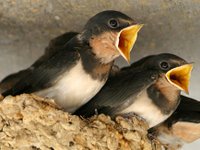 Most of our songbirds are altricial – like humans, they are born helpless and need to be waited on, break and foot, by their parents. To be fed, the youngest simply hold open mouths so wide, they seem to dwarf their bodies. As they grow older, they add voices to their food demands. And by the time they leave the nest, they twitch for attention – standing on a branch, wildly wiggling their bodies and their slightly open wings as a parent approaches with dinner.
Most of our songbirds are altricial – like humans, they are born helpless and need to be waited on, break and foot, by their parents. To be fed, the youngest simply hold open mouths so wide, they seem to dwarf their bodies. As they grow older, they add voices to their food demands. And by the time they leave the nest, they twitch for attention – standing on a branch, wildly wiggling their bodies and their slightly open wings as a parent approaches with dinner.
This behavior may have inspired the British word, twitcher, which means a fanatic bird-watcher: It is said that true twitchers go into uncontrollable spasms of excitement at the sighting of a new species. So the next time you see a young sparrow or robin twitching for its lunch, think of an otherwise staid Englishman in his tweeds, binoculars raised, posterior all a-wiggle at the joy of spotting a Long-tailed Tit.




No comments:
Post a Comment